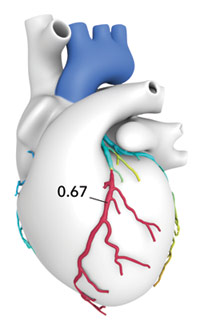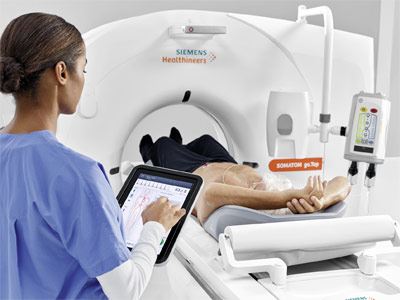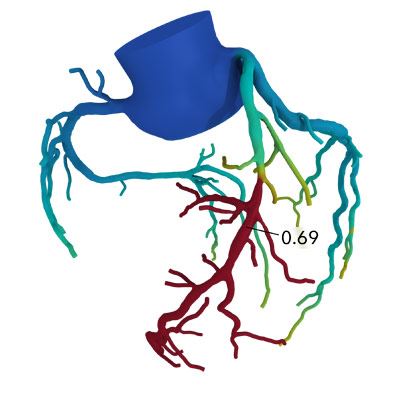Transforming Cardiac Care
Revolutionary Noninvasive Technology Uses Artificial Intelligence to Evaluate Heart Disease
With Fractional Flow Reserve – Computed Tomography (FFR-CT), a 3D view of your heart's arteries can be assessed by your physician without an invasive procedure. Unnecessary invasive heart procedures can be avoided with this new non-invasive test.
Coronary Artery Disease (CAD) is the leading cause of death for both men and women in the United States. CAD develops when the arteries leading to the heart narrow or become blocked, which may lead to a reduction in blood flow to the heart, causing chest pain, heart attacks and death.
Do you have a question? Request more information and we will connect you with an RWJBarnabas Health cardiovascular expert.
About FFR-CT
 Fractional Flow Reserve – Computed Tomography (FFR-CT) is a type
of non-invasive procedure (no incisions required/small puncture/low to
moderate sedation) which uses HeartFlow Analysis, to provide your doctor
with a 3D model of your coronary arteries (arteries that supply blood
to your heart) as a way to identify any potential blockages.
Fractional Flow Reserve – Computed Tomography (FFR-CT) is a type
of non-invasive procedure (no incisions required/small puncture/low to
moderate sedation) which uses HeartFlow Analysis, to provide your doctor
with a 3D model of your coronary arteries (arteries that supply blood
to your heart) as a way to identify any potential blockages.
Blockages typically occur due to coronary artery disease (CAD). In people with this condition, the arteries leading to the heart become narrowed or blocked (atherosclerosis), which may lead to a reduction in blood flow to the heart, causing chest pain, heart attack, or even death.
Despite being the most common form of heart disease, many of the non-invasive tests available today have low accuracy rates in detecting the disease. FFR-CT provides your doctor with highly accurate and detailed information which was previously only available through an invasive procedure, helps your doctor determine the next step in your treatment plan.
How Can the FFR-CT Analysis Help?
How It Works
-
Your doctor will order a coronary CT scan to look for blockages. If additional
information is needed, your doctor may order a HeartFlow Analysis. This
does not require another appointment and there is no additional risk to you.

- Using your CT scan, the HeartFlow technology creates a personalized digital 3D model of your coronary arteries. With trained specialists and powerful computer algorithms, the HeartFlow Analysis calculates how much each blockage limits your blood flow.
-
Your doctor receives a digital, color-coded 3D model of your coronary arteries.
This information helps you and your doctor determine the next step in
your treatment plan.

Benefits
- Provides a more detailed view of the significance of your coronary artery blockage than a standard coronary CT scan.
- Non-Invasive - no additional risk to you.
- Reduces the need for follow-up testing and evaluation.
- Helps your doctor better determine the appropriate treatment of care.
How to Prepare for the Procedure
Before the procedure, your doctor and treatment team will explain to you what to expect before, during and after the procedure, and potential risks of the procedure. Talk to your doctor about:
- All medications, herbal products and dietary supplements you are currently taking; ask for their recommendations about each.
- Diabetes and how to adjust your medicine on the day of the procedure.
- Radiation exposure, especially for those that are pregnant.
- Any allergies to medicines, latex, tape, iodine, and anesthetic agents.
- Any history of bleeding disorders.
- Any implanted device (for example, a pacemaker or ICD).
- Any body piercings on your chest or abdomen.
Other recommendations include:
- Eat a normal meal the evening before the procedure. However, do not eat, drink or chew anything after midnight before your procedure. If you must take medications, only take them with sips of water.
- Leave all jewelry at home.
- Remove all makeup and nail polish.
- Wear comfortable clothing when you come to the hospital.
- If you normally wear dentures, glasses, or hearing devices at home, plan to wear them during the procedure.
What to Expect Before the Procedure
To determine whether you need this procedure, your doctor might perform a variety of diagnostic tests and procedures including:
- X-Rays
- Echocardiogram (ECHO)
- Electrocardiogram (EKG/ECG)
- Stress test
- Computed tomography (CT scan)
- Magnetic resonance imaging (MRI)
What to Expect During the Procedure
The FFR-CT procedure usually takes 30 minutes. The procedure is usually done in the catheterization lab. Check with your doctor about the details of your procedure. In general:
- You will lie still on the table, and the table will slide into the CT scanner.
- Talk to your doctor if you are uncomfortable in tight or closed spaces to see if you need medicine to relax you during the test.
- During the scan, the technician will monitor your heart rate with an electrocardiogram (EKG).
- You will hear soft buzzing, clicking, or whirring sounds when you are inside the scanner and the scanner is taking pictures.
- You will be able to hear from and talk to the technician performing the test while you are inside the scanner. The technician may ask you to hold your breath for a few seconds during the test to avoid blurring the images.
- If additional information is needed from your coronary CT scan, your doctor may order a HeartFlow analysis.
- Using your CT scan, the HeartFlow analysis creates a personalized digital 3D model of your coronary arteries. With trained specialists and powerful computer algorithms, the HeartFlow analysis calculates how much each blockage limits your blood flow.
- Your doctor receives a digital, color-coded 3D model of your coronary arteries. This information helps you and your doctor determine the next step in your treatment plan.
What to Expect After the Procedure
After the procedure, you may be able to go home the same day.
Your doctor will give you instructions to follow during your recovery.
Tell your nurse right away if you feel any chest pain or tightness, or any other pain, as well as any feelings of warmth, bleeding or pain at the insertion site.
Do you have a question? Request more information and we will connect you with an RWJBarnabas Health cardiovascular expert.
